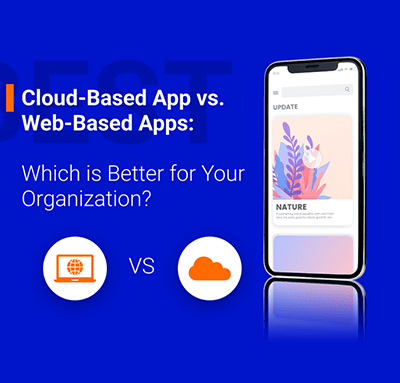
About us
Our Services
Our Expertise
Our Experience
Follow us
Why e2logy?
- We strive to provide superior customer service and ensure that every client is completely satisfied with our work.
- Our engineers are trustworthy, dedicated, and experienced and will go the extra mile to solve your IT issues.
- We are committed to delivering outstanding, cutting-edge IT solutions that add real value that goes beyond what is expected.

Cloud-Based App vs. Web-Based Apps: Which is Better for Your Organization?

Have you pondered the difference between web-based apps and cloud-based apps when it comes to starting your online venture? Interested in turning your concept into reality, but don’t know which route to take: cloud or web? That is what many people are wondering. Read this blog for answers to those questions.
Although you might have some great ideas for a web app or cloud-based web app, this does not indicate you can create it yourself without any technical knowledge. For the right guidance in this regard, most people will need to consult with a dependable web development company. If you do not have a promising idea for a web or cloud-based app, then hiring a cloud-based app developer is the best solution for your business.
When it comes to doing business online, cloud-based technology is fascinating. Another challenge is that it involves complex terms and tools, which many people find a little unnerving. Cloud-based technologies are also supported by web applications, but these are not the same thing. Most people also mistake these two for being similar and cannot distinguish between them.
Looking at the components and the functionality of the two technologies reveals a stark contrast, but in today’s ever-changing world, one wonders if people will be able to see their work for themselves. When viewed in detail, the lines between these two technologies remain blurry, but they have significant differences that make them distinct.
Cloud-based applications
Cloud-based web apps are the result of the evolution of the existing web environment. Web apps are the foundation for this concept, which explains why cloud applications require web apps first.
Web-based apps also access online services through the internet, as do cloud-based applications. In contrast, the cloud-based application does not rely on Internet browsers to perform its functions. The software can be customized to the greatest extent possible on the cloud. Users can access cloud services using a web interface when they need to access cloud services online.
The Benefits of Cloud Apps
Cloud apps intend to offer users convenience, whether it be through on-demand services, network availability, or pooled resources for usage. Therefore, cloud apps offer the following benefits:
- Management effort and service provider interactions are minimal when using cloud apps.
- Using on-demand services, users can customize their services based on specific needs. No matter where you are, you can access the information on any mobile device.
- Online, as well as offline computing capabilities, are available with cloud apps.
- Customers typically do not purchase software with cloud apps, but instead, pay for the services they receive from it. Through the cloud, users can access necessary applications immediately.
- Customers are still able to use the app’s functionalities even if they do not install any software on the servers.
- Streamlining work processes and increasing profitability can be accomplished with the help of cloud services.
- Multiple users with a variety of physical and virtual needs can take advantage of cloud apps because they pool resources.
- In terms of storage, processing, memory, and network bandwidth, cloud systems can help businesses scale rapidly outward.
- Monitoring, reporting, and controlling the use of resources are possible. Consumers and resource providers will have access to transparent information.
- Depending on the usage of the software, the app can charge a different amount.
Web Applications
These applications are designed to run in a web browser, as their name suggests. Client-side scripts are implemented side-by-side with server-side scripts. When it comes to web-based application development, the browsers rely on the webserver components, which in turn are supported by the network backend infrastructure.
A Web app can also be accessed from any location since its computing model allows for access from anywhere. Although cloud apps tend to offer limited customization options, they are distinct from web apps. Moreover, they were not designed so they could accommodate a variety of consumer requirements.
A cloud-based application is also known as a web-based application. Web-based applications can operate through web browsing, but they lack the functionality of cloud-based applications. Companies that create web applications bundle them into ‘cloud’ applications, and sell them as such, making them very influential in modern technology. Although bundled web-based applications perform similar tasks as real cloud applications, buyers should be aware that they are different from cloud applications.
Web apps offer the following benefits:
-
- You can access these apps through any web browser from anywhere.
- This means the apps are cross-platform compatible, meaning they can run independently of the operating system or device.
- The browser must be compatible for users to access web apps efficiently, so compatibility issues are reduced.
- The developer’s support and maintenance of a web app are less than that of a desktop application, and the end user’s computer requirements are lower. Web apps are thus less expensive to develop, and customer usability is improved.
- Users can use web apps without downloading any files, thus reducing the size of their hard drives.
- There is no storage of client information. To retrieve and verify the information, the data servers of the enterprise are responsible. The result is that subscription-based web applications are less likely to be pirated.
Differences between Web-Based and Cloud-Based Technologies
Difference 1: Origin
Their respective dates of origin are the most obvious differences between the two phrases. A web application was used and coined much earlier than a cloud app and can be any application available over the internet. JavaScript was widely used to differentiate the new features of mobile or web applications when web designers began to use front-end frameworks based on the language.
Difference 2: Technology
The term “web application” usually refers to applications that utilize early web technologies and are designed using powerful back-end programming languages, such as Python, PHP, Ruby, and .NET, along with remote databases, such as MySQL, PostgreSQL, SQL Server, etc. In addition to using JS and its early frameworks like JSON, JQuery, and AJAX to improve the user’s experience on the front-end, web apps require access to the Internet to work.
However, cloud-based apps also take advantage of powerful JavaScript frameworks, such as React.js and Angular, which are optimized for performance. Alternative database technologies such as Firebase and locally accessed databases are being incorporated into cloud apps. Cloud apps and HTML5 offline caching capabilities enable these frameworks to function even when there is no Internet connection thanks to the use of cloud apps and HTML5.
Difference 3: Uses Cases
The development of web apps was prompted by the fact that cloud apps can work partially or fully offline. Consequently, they are ideal for applications requiring prominent levels of computation or requiring reliable operation in areas with intermittent connection to the Internet. Web-based collaborative applications are favored for processes requiring heavy collaboration, but there are many alternatives available. Additionally, transactional applications, such as message boards, e-commerce sites, information sharing portals, and booking services, web applications work only within a browser when there is an internet connection.
Difference 4: Cost
An offline web application that is as reliable and as easy to use as a browser-only application requires more development effort. Web or mobile application developers are less likely to have the requisite skills, and the cloud-based app development team is always bigger than those simple web applications. The price of cloud apps can be significantly higher than web-based apps because of these reasons.
Difference 5: Popular Services
From a non-technical perspective, perhaps understanding the difference between these two words comes from looking at the products we use. It is most popular to use web applications that require a continuous connection so they will work properly. This can be seen on websites such as Wikipedia, Airbnb, Amazon, and YouTube. Cloud-based apps should work offline and sync in the background when the connection is restored. Cloud apps like Salesforce, Ever-note, Gmail, Dropbox, and Slack are among the most popular.
What Should Be Your Ultimate Choice?
The development of mobile apps is undergoing rapid changes. The frequency and type of user interaction have risen. Additionally, the change in device types will lead to the development of multidimensional experiences within apps in the future. Consumers use web browsers as the most popular method of interacting with the internet. We can expect this trend to continue to increase as immersive, voice-driven devices invade our daily lives. Web apps will become more needed as interaction modes evolve.
Optimizing a web-based app to perform smoothly boosts user experience and helps convert prospects into customers. Also, the higher reach can lead to increased profits. As a result, virtualization is becoming more integrated into entire companies. Cloud-based software delivery and data handling platform is being implemented for re-engineering processes.
Developing Apps to support multiple online activities will become increasingly essential as we enter the digital era. Companies are also beginning to recognize the advantages of cloud computing.
In the wake of the COVID-19 pandemic, cloud technology has become more essential than ever. This type of computing is transforming how humans interact with data and technology. It is also proving to be a powerful tool for supporting and deploying management services.
Most importantly, cloud apps are helping companies to add more value to their operations. By utilizing resources both internal and external, businesses can achieve their business objectives more effectively.
Let us Wrap Up
Despite this, both cloud apps and web apps serve different audiences and objectives yet share 90% of their DNA. If you are deciding which software development option to choose, we recommend you consider the needs of your users first.
If you choose the wrong option, you could pay twice as much, or your application might not suit your purposes.
Be wise and select the web or cloud-based application that is most effective and efficient for your business. A mobile app developer can help you choose the appropriate technologies according to your business requirements if you wish to have a mobile app.













